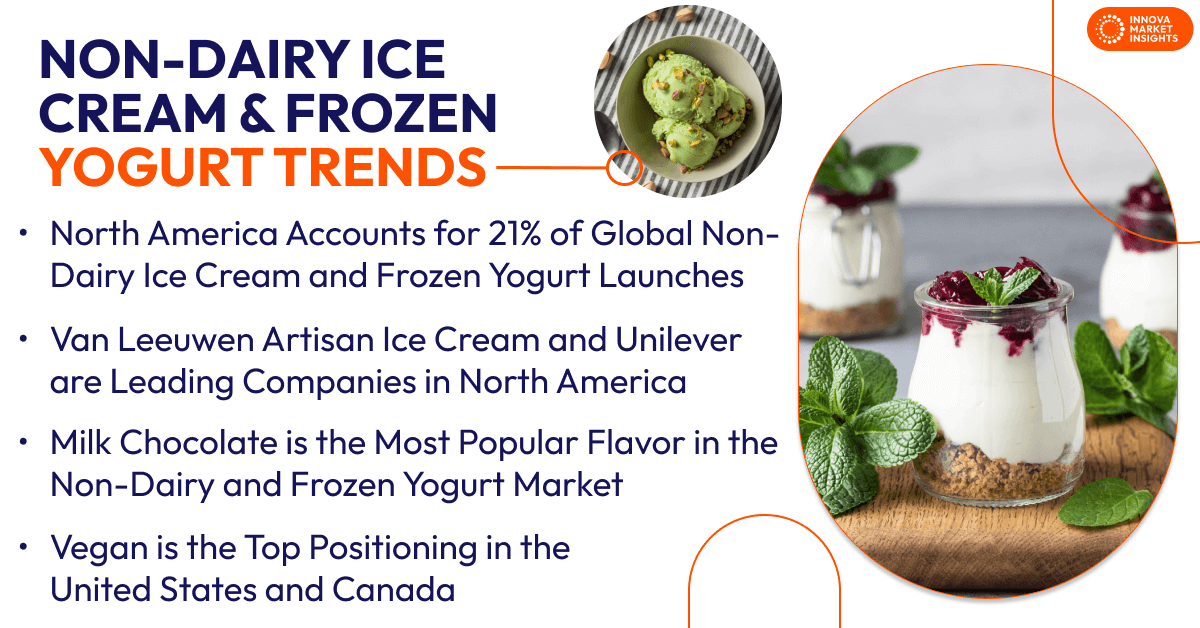August 2, 2024 – Non-dairy ice cream and frozen yogurt are a staple of comfort for consumers in North America. They prefer these products for their dietary benefits, health advantages, and due to their growing interest in plant-based options. Innova’s 360 research into non-dairy ice cream and frozen yogurt trends reveals top brands, and product launches, providing key insights for brands looking to capitalize on this growing category.
Product Launch Trends
In the past year, North America has accounted for 21% of global non-dairy ice cream and frozen yogurt launches, making it the second leading market after Europe. Free-from ranges targeting consumers with allergies, such as gluten free, grain free, and lactose free options, as well as clean label products, have supported the diverse dietary and taste preferences in North America.
There has been a 2% rise in non-dairy ice cream and frozen yogurt subcategory launches in North America over the past two years. This growth is driven by formulations incorporating a variety of bases, which include grains, fruits, nuts, and seeds, and using cocoa in different formats to achieve new taste profiles. This highlights the diverse landscape of the non-dairy ice cream and frozen yogurt subcategory.
The United States is a predominant country in the North American non-dairy ice cream and frozen yogurt market, with an average of 88% of launches over the past five years. Dairy-free pops in classic flavors, cashew-based frozen desserts with indulgent additions, frozen dessert bars, gelato offerings, and choices in cones have pushed the launches across the country. Canada is also displaying stable growth in new product launches.

Top Companies and Brands
Van Leeuwen Artisan Ice Cream and Unilever are leading companies in the North American market for non-dairy ice cream and frozen yogurt launches. Notable companies like Goodpop, Cosmic Bliss, and So Delicious Dairy Free also contribute to the subcategory’s growth.
Van Leeuwen Artisan Ice Cream leads with 6% of launches over the past year. Their vegan choices, frozen desserts with various flavor combinations, and frozen dessert sandwiches remain attractive.
Unilever, one of the world’s largest FMCG businesses, is highly driven by its brand, Ben & Jerry’s. Launches with its fudge brownie and chocolate chip cookie dough-flavored ranges have boosted the company’s new product development.
Claims and Positionings Trends
Vegan is the top positioning in the United States and Canada for non-dairy ice cream and frozen yogurt products. Plant based, gluten free, GMO free and organic are also often seen in this subcategory.
Additionally, low sugar, reduced calorie, grain free, indulgent and premium, and lactose free claims are growing strongly in the space. This indicates a rising desire for diverse and healthier options in this subcategory.
Flavor Trends
Milk chocolate is the most popular flavor in the non-dairy and frozen yogurt market, followed by vanilla, chocolate chip, peanut butter, and strawberry.
Non-dairy and frozen yogurt trends research in North America highlight diverse flavor preferences. In the United States, brownie, pistachio, and honeycomb are gaining popularity among consumers, while in Canada, there is rising interest in caramel and cookie dough flavors. This suggests a growing demand for unique and indulgent taste experiences across the region.
What’s Next in Non-Dairy Ice Cream and Frozen Yogurt Trends?
The United States leads in non-dairy ice cream and frozen yogurt product launches, with brands focusing on plant-based protein. Consumers are increasingly focused on vegan and plant- based options in this market. Brands can capitalize on this trend by innovating products with plant-based proteins like pea, fava bean, and rapeseed, along with inclusions of nuts and seeds and a variety of plant-based milks.
Free from positionings drive innovation in the non-dairy ice cream and frozen yogurt market. Brands can leverage this by developing products that address allergen concerns, which include GMO free, gluten free and lactose free options. Consumers seek healthy indulgence, and brands can meet this demand by incorporating nutraceuticals like inulin and adaptogenic ingredients such as astragalus, ginkgo biloba, and holy basil to promote overall wellness.
Brands that differentiate themselves by offering unique flavor combinations and enhancing nutritional profiles are likely to cater to the evolving consumer demand for both indulgence and functional benefits.
This article is based on our report, “Overview of Non-Dairy Ice Cream & Frozen Yogurt in US & Canada.” If you are interested in reading this report, feel free to request a demo.
You can do this by either booking a demo or using our Contact Form.